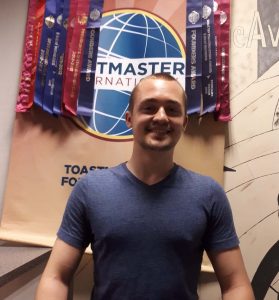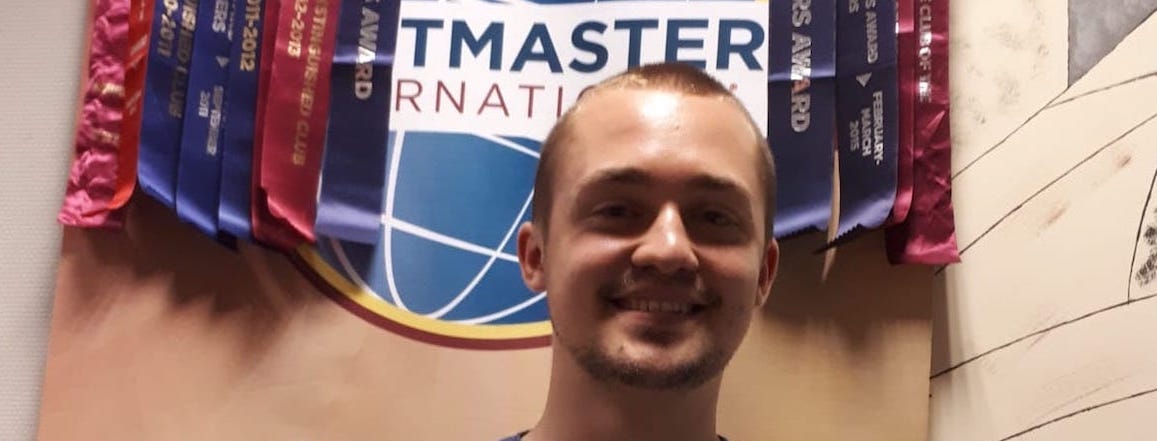This article features an interview with Tim – newbie at TMFonske. In his impressive first speech he spoke about his speech impediment-stuttering and shared his experience in coping with it.
- How does stuttering impact your speaking in daily life?
Stuttering sometimes makes my speaking less fluent in daily life. However, stuttering does not stop me from talking! I suppose I’m somewhere in the middle a notch over to the talkative side. I do have the urge to talk to people and express myself every day, but I also like to have some me-time to reflect every day. Jan Provoost, a member of our club, recently sent me a very interesting article about “personality preferences: extra- and introversion and authentic action” by Rediscovering Yourself. This article made me realise that I am an introvert feeler and thinker but an extrovert creator and experiencer. How talkative I am also really depends on the people I’m with and how comfortable I am with them. There have been people in the past that have said that I need to open my mouth more just as there have been quite some people who’ve told me I needed to learn to be a better listener. (And to please the latter, I’ve taken a course on learning to be a better listener last year.) I do know quite a lot of fellow stutterers, but I don’t have any real ‘stuttering friends’ that I meet with often. To talk about my life and the juice stuttering ads to it, I have my speech therapist who I try to meet with regularly. 
- How did you come up with the idea of joining Toastmasters?
Last summer I did a meditation course where I met Thomas Blaye, VP Membership of Fonske Leuven. The meditation course was held in Leuven, it took about 5 days and it dealt with Transcendental Meditation or TM, which can be shortly explained as a sort of mantra meditation you do about twenty minutes twice a day. Thomas was a friend of the meditation teacher and that day his job was to welcome the new meditation students of the teacher (including me) and to have some chitchat with them. So that day I walked into the living room of the teacher and Thomas welcomed me and started talking to me and I replied along with some sturdy stutters. This caused us to talk a bit about my stuttering and after 5 minutes, he took out his Toastmaster’s Competent Communication manual and he showed it to me. He explained what Toastmasters was, that he was preparing himself for his first speech and he said that I should try it since he thought that it maybe could help me with my stuttering. It sounded nice and I thought Thomas was a super cool and interesting guy so this led me to come to some meetings and to eventually become a Toastmaster myself.
- Being self-conscious about stuttering influences your speech preparation ?
I think that the ‘preparing for a speech’ process is completely the same for a stutterer as for a non-stutterer. However, I took the opportunity to talk about stuttering in my first three speeches. The reason for this is that I figured you would all hear me talk a lot and consequently, that you would all hear me stutter a lot. And for me it is always much nicer and more comfortable talking and stuttering to people who I know, know that I stutter and who know a tiny bit about stuttering than to people who I haven’t had the conversation with yet. Talking to people about my stuttering dissolves the potential awkwardness around it (at least for me).
- How has Toastmasters positively impacted your stuttering until now? Does it decrease the stuttering itself during the speech?
Thanks to Toastmasters, I am absolutely feeling more comfortable on stage! Practice gives confidence; practice makes perfect! If I ever imagined that I would be comfortable and able to talk fluently on stage? I’m going to answer this question in two ways. 1. Did I ever imagine that I would be able to talk and be comfortable on stage? Absolutely! Believe it or not, I’ve always loved to give presentations (in school) and to stand on stages. I’ve always liked it a lot more than most of my peers (but I believe this is due to my personality and not my stuttering). 2. Did I ever imagine that I would be able to talk fluently on stage? “Fluently”. If you make it yourself your goal as a stutterer to be able to talk fluently/smoothly/without stutters, you’re shooting yourself a bit in the foot, according to me and my speech therapist. If I’m a stutterer and my goal is to be able to talk without stutters, than every time that I’m talking and I do make a stutter I will be angry/frustrated/disappointed/… and this will only worsen the stuttering. You’re goal as a stutterer should be to be as comfortable as possible with you being a stutterer, making stutters and to be confident in your ability to deal with your stutters in a healthy way. You can compare stuttering with slipping. When you go to a slip school, you’re not going to learn how to avoid and prevent in all possible ways you slipping, but you’re going to slip as much as possible in order for you to learn what to do when you slip and in order to give you the confidence that when you actually slip with your car in real life, you’ll be able to deal with situation. This analogy explains what my speech therapist has been trying to teach me for over 10 years.
- Can you describe your ultimate goal or dream in public speaking?
I believe that captivating your audience can be done with techniques, like for example having a kick-ass opener. I believe that Toastmasters can help me to learn to shape and to structure my speeches in such a way that it will improve their ‘captivity’. How do I want to add value to other people’s lives with my speeches? By offering them kick-ass content that they can use to actually enhance their lives, tailored in such a way that they actually receive the message and that it gives them the motivation to act on it. I’m not sure if I am using techniques of physiotherapy, but I do have been using a gratitude journal for over year now, which you will learn about in my next speech. I believe that the habits we have are hugely important for the quality of our lives, which is why I try to cultivate as many good habits as possible. I try to exercise as much as possible (judo), I try to eat as healthily as possible, I write every day in a gratitude journal, I try to meditate twice a day for twenty minutes and, since I’m going on Erasmus to Sweden next year, I’m learning 20 minutes a day Swedish on duolingo.

